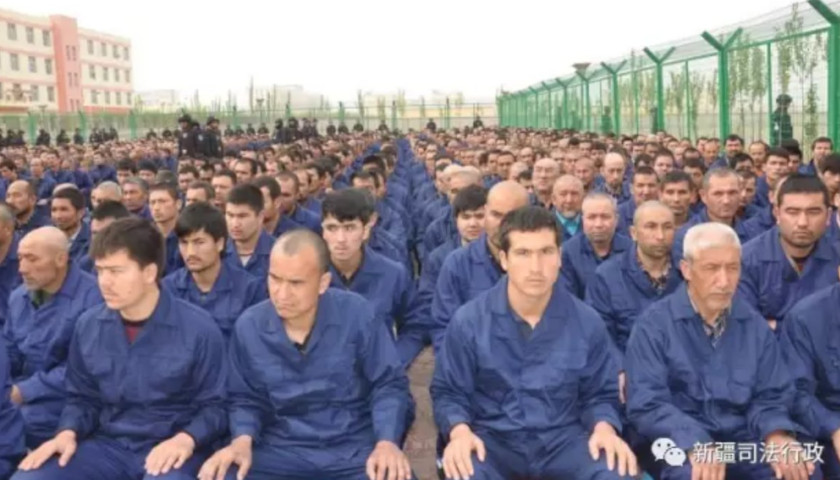by Catherine Mortensen
Yo͞ohwäjän chaired the Russian language department at Nanjing University in China when she was taken. RenagulGheni was the mother of two children, a professional artist and art teacher in the Chinese government schools when she was taken. AituganTurlanuuly was a servant of the Chinese government when he was taken. BaimuratNauvizbek was living in the Xinjiang province when he was taken. They were all taken by the Chinese Communist Party (CCP) and imprisoned in concentration camps. In some cases, they were imprisoned for practicing their religion, in other cases, their families have no idea why their loved ones were taken.
The Captive Nation’s Coalition, part of the Committee on Present Danger: China, is giving voice to these oppressed Chinese people. The group released a series of short videos sharing stories of an individual who escaped a concentration and others whose family members are still trapped in one.
“These people are yearning to have their voices heard,” said Se Hoon Kim, Captive Nations Coalition director. “We want to get their voices to the American public. This will help to remind everyone why we must protect our freedom,” added Kim. “What is happening in China right now is unimaginable to those of us in the free world.”
Yo͞ohwäjän believes she was imprisoned because she practiced a form of Buddhism calledFalun Gong, which she says “emphasizes the core principles of truthfulness, compassion, and forbearance.
“In the labor camp and the prison I was forced to run and march for long hours under the blazing sun. For nearly 50 days I encountered the forcible sleep deprivation and the police fed me with unknown drugs several times which made me feel dizzy, having heart palpitations and their trembling so vigorously that I nearly couldn’t breathe. I was nauseous and experienced tram twitching and the muscle pain. What I witnessed in the persecution was just a tip of iceberg for the systematic crackdown.”
Yo͞ohwäjän said these CCP torture tactics have been applied to the prosecution of weaker Tibetans and Hong Kong people, as well. She describes the CCP as a cancer with the ultimate goal “to destroy human beings.”
KalbinurGheni, a Chinese Muslim, known as a Uyghur, says she lost contact with her sister, art teacher RenagulGheni, two years ago after Renagul was detained in a Chinese concentration camp. “My sister is better educated than 80 percent of Chinese people. She doesn’t have to be reeducated in a Chinese concentration camp. She has a degree. She is a professional painter and speaks very good Chinese.”
In BaibolatKunbolatuuly’s short video, he looks straight into the camera and says, “I am begging for your help.” He tells the story of how his brother, BaimuratNauvizbek, was detained by local police in the Xinjiang province of China and sentenced to 1 ½ years in a camp “for no reason.” That sentence turned into 10 years.
“Now my brother Baimurat has been in prison for about 903 days,” explained Kunbolatuuly. “I very worry about safety of my brother. We don’t know whether he is alive or dead. We could not contact his parents in China, also.”
AkhanTurlanuuly, shared that his brother, AituganTurlanuuly, worked as a country servant in the Xinjiang province for 18 years when one day at 2 a.m., the CCP took his brother from his home and “for no reason, imprisoned him into communist camp.
“Now he is in Zhaosu Prison. We heard from people in the camp that he was sentenced to two years. But two years prison time has finished, and he has not been released. I could not contact with my family, even with my parents and brothers in China for 3 years now. It is very depressing for every one of us.”
His video closes with a heartfelt please to human rights organizations, asking simply, “Please help us.”
“While it is difficult to hear these stories of oppression, it is important that Americans know the truth about communist China,” said Rick Manning, president of Americans for Limited Government. Manning’s group is seeking to get Americans divested from China. “Millions of Americans are unwittingly helping to fund these concentration camps through their retirement investments and this is morally repugnant.”
In total, American pension and mutual fund holders and other investors have put more than $381 billion in Chinese and Hong Kong companies’ equities and bonds held overseas, according to U.S. Treasury data. Many of these companies engage in child and slave labor according to an annual report on child and forced labor by the Department of Labor Bureau of International Labor Affairs.
Manning is part of a national coalition urging federal and state authorities to rid their pension funds of Chinese investments, to delist Chinese companies from U.S. exchanges and to have the Department of Labor deem that non-transparent Chinese state-owned companies are unsuitable for 401(k) and other pension investments under ERISA.
In May, President Trump responded to the human rights pleas by ending plans within the federal Thrift Savings Plan to begin investing in Chinese assets. The TSP is a retirement savings and investment plan for federal employees and members of the uniformed services similar to a private sector 401(k) plan.
“Americans don’t want to be slaveholders,” added Manning. “We rejected that a long time ago. What China is doing, and trying to hide from the world, is evil. By divesting from China we hope to bring an end to these abuses.”
The website, www.DivestChinaNow.org has been established for those seeking more information on this critical human rights effort.
– – –
Catherine Mortensen is vice president of communications for Americans for Limited Government.
Photo “Uighur Muslims” by the Uyghur Human Rights Project.






What about India’s concentration camps for Muslims and other dissidents? They’re just as bad as China’s!